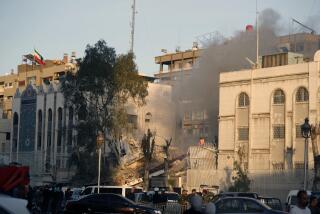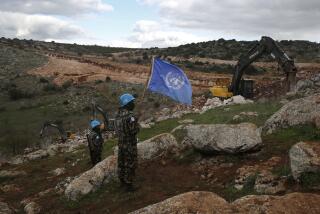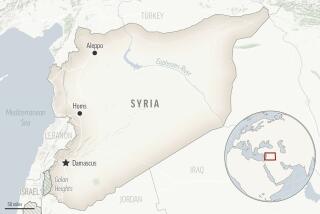Deadly car bombs shake Syrian city of Dara
BEIRUT — Several car bombs rocked the southern Syrian city of Dara on Saturday, a day in which opposition activists meeting abroad failed again to reach agreement about the shape of a government-in-exile acceptable to the United States and other nations sympathetic to the rebellion against President Bashar Assad.
The explosions in Dara — where the opposition movement sprang up almost 20 months ago — come as escalating turmoil envelops Syria amid new United Nations warnings that a humanitarian crisis could morph into a catastrophe. Colder, wetter weather is complicating efforts to aid about 2 million people already displaced by the fighting.
The government and the opposition gave divergent accounts of the bombings in Dara, 60 miles south of Damascus, the capital.
The opposition said a pair of car bombs targeted military installations in Dara, killing at least 20 soldiers. A separate account from a pro-rebel group put the number killed or injured at 50, but provided no breakdown of the casualties.
Government media said “terrorists” — the official label for armed rebels — detonated three car bombs on public streets, killing seven civilians and injuring others.
Unverified video posted on the Internet showed a huge plume of black smoke rising above Dara as what was described as the second bomb detonated. Video shown on state TV showed twisted wreckage and a deep crater on a street where one of the booby-trapped vehicles apparently exploded.
Car bombs and roadside explosives have become weapons of choice for Syrian insurgents, who cannot match the military’s firepower, including fighter jets, helicopters and tanks. Rebels say the explosive devices are deployed only against military targets. The government says car bombs regularly target and kill civilians.
There is no sign of an end to the international impasse on Syria and little indication that the nation’s deeply divided opposition factions are any closer to forging a united front.
In an interview broadcast last week, Assad told a Russian television station that “I have to live in Syria and die in Syria,” rejecting any notion that he would accept “safe passage” to a third country.
United Nations-backed efforts to end the fighting in Syria have failed amid deep divisions on the Security Council. The United States and its allies have pushed for sanctions and other actions against Assad, but Russia and China have used their veto power to block any move against the Syrian government.
The United States and other nations calling for Assad’s resignation are pressuring the Syrian opposition to form “a more unified, more diverse, more geographically representative group that is connected to what’s going on on the ground,” Victoria Nuland, State Department spokeswoman, told reporters in Washington on Friday.
Nations supporting the opposition would like to see a coherent government-in-waiting that could receive and distribute aid and exercise some control over the many anti-Assad militias fighting in Syria.
The best-known opposition faction, the Syrian National Council — formed a year ago in Istanbul, Turkey — has been meeting in Doha, capital of the Persian Gulf nation of Qatar, and trying to shed its negative image as too exile-heavy, out of touch with events in Syria and dominated by the Muslim Brotherhood, the Islamist group. But council members are pushing back at Secretary of State Hillary Rodham Clinton’s recent critique that the group “can no longer be viewed as the visible leader of the opposition.”
The council elected a new president, George Sabra, a longtime leftist dissident who immediately told reporters that foreign governments must provide heavy arms to the opposition, repeating an oft-repeated demand. “We need military equipment — rockets against tanks and airplanes to protect ourselves,” Sabra told Reuters news agency in Doha.
The United States says it has provided only nonlethal aid to the Syrian opposition. The White House worries that advanced weaponry could fall into the hands of militants and Al Qaeda sympathizers fighting alongside some of the Syrian rebels.
Despite the U.S.-led push for a revamped opposition, the Syrian National Council seems determined to maintain a dominant position.
But new rifts have appeared in the opposition front. Several well-known Syrian activists have quit the council.
“In recent months I watched painfully how the struggle of the council turned from the struggle for freedom to a power struggle between a group of blocs and personalities,” said Yara Nseir, an activist and council member who announced her resignation in a highly critical statement.
Council co-founder Adib Shishakly, a grandson of a former Syrian president, also left the group, assailing the council as “clinging to power.”
Many Syrians in and outside the country have criticized council members for lavish expenditures and a fondness for high-priced hotels, such as the Ritz-Carlton, Doha, where the opposition group has been meeting for a week.
“I feel guilty being here,” said one activist upon arriving from war-torn Syria. “People inside are dying and here I am in a five-star hotel.”
The fractious anti-Assad alliance is expected to continue discussions Sunday. The United States and more than a dozen other nations calling for Assad to step down have also sent representatives to Doha. Whether a revitalized opposition leadership structure will emerge from the talks remained unclear.
Marrouch is a special correspondent.
More to Read
Start your day right
Sign up for Essential California for news, features and recommendations from the L.A. Times and beyond in your inbox six days a week.
You may occasionally receive promotional content from the Los Angeles Times.






